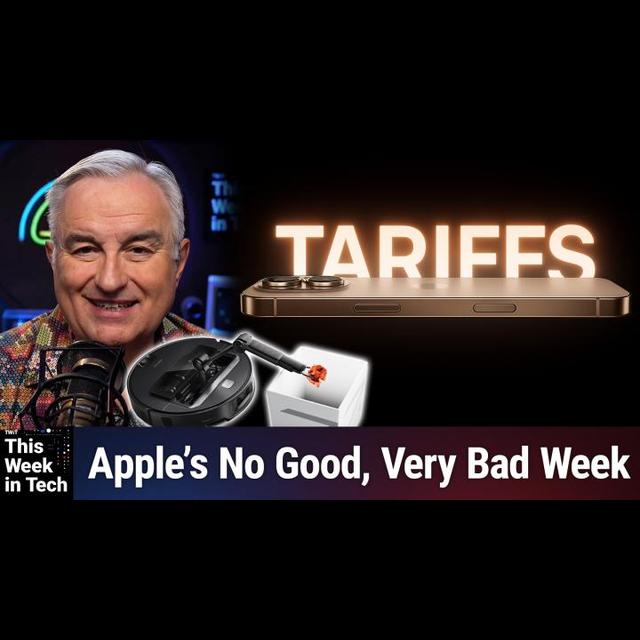May 28th 2025
AI-generated, human-reviewed.
When President Trump announced his intention to slap a 25% tariff specifically on Apple's iPhones unless the company starts manufacturing them in the United States, it immediately became the hot topic on the latest episode of This Week in Tech. Host Leo Laporte and his panel of tech industry experts, Jennifer Pattison Tuohy, Brian McCullough, and Mike Elgan didn't mince words about the feasibility, or lack thereof, of this high-stakes economic gambit.
The Math Problem That Won't Go Away
The most compelling criticism came from the show's analysis of the basic economics involved. As the panelists broke down the numbers, a glaring issue emerged: even with a 25% tariff, importing iPhones would still be dramatically cheaper than manufacturing them domestically. The reality is that to make US manufacturing cost-competitive with current imports, the tariff would need to be closer to 200%—a number that would make iPhones prohibitively expensive for most consumers.
This isn't just theoretical speculation. The show referenced expert analysis suggesting that a US-manufactured iPhone could easily cost $2,000 or more, making the 25% tariff look like a bargain by comparison. The fundamental question became: if the goal is to encourage domestic manufacturing, why choose a tariff rate that's too low to actually achieve that objective?
Apple's Impossible Position
The discussion revealed just how precarious Apple's situation has become. Tim Cook's recent White House meeting, followed immediately by Trump's tariff announcement, suggests that traditional corporate diplomacy may not work as it has in the past. Leo noted that Apple CEO Tim Cook even contributed $1 million of his personal money to the inaugural fund, yet still found himself in the crosshairs.
The show explored Apple's limited options: absorb the cost and reduce profit margins, pass the expense to consumers, or commit to a manufacturing transition that could take a decade to implement. With Apple's profit margins exceeding 40%, the company could theoretically absorb a 25% tariff hit, but Wall Street's immediate 3% stock price drop following the announcement suggests investors aren't confident in any easy solutions.
The Game Theory Dilemma
One of the most insightful parts of the conversation focused on the unpredictability factor. The panel discussed how previous administrations' trade threats often followed predictable patterns, allowing companies to develop strategies. However, the current situation presents what they call a "game theory nightmare"—even if Apple makes concessions or announcements, there's no guarantee it will satisfy the demands or prevent future escalations.
The show referenced historical precedents where companies made grand manufacturing announcements that ultimately amounted to little more than photo opportunities. The famous Foxconn Wisconsin plant, which still hasn't broken ground after years of promises, is a cautionary tale about the gap between political theater and economic reality.
The Broader Industry Impact
While Apple grabbed the headlines, the discussion clarified that this isn't just about one company. The threat extends to Samsung and "anybody that makes that product," creating industry-wide uncertainty. The panelists explored how this could accelerate the existing trend of companies moving manufacturing from China to other countries like Vietnam and India, though notably, Trump specifically criticized Apple's expansion in India as undesirable.
The conversation also touched on how other tech companies have quietly handled similar pressures, such as Microsoft's strategy of raising Xbox prices globally rather than just in the US, effectively masking the tariff impact as a worldwide price adjustment.
The Innovation Angle
Perhaps most concerning to the tech experts was how trade tensions might impact innovation. The show discussed how integrated global supply chains have allowed US companies to focus on high-value activities like design, engineering, and software development while leveraging global manufacturing efficiency. This division of labor has been a key factor in America's tech dominance, and disrupting it could have unintended consequences for competitiveness.
The panelists also explored the national security implications, noting that economic interdependence has historically served as a deterrent to military conflict. Severing these connections could paradoxically increase geopolitical tensions rather than resolve them.
What Happens Next?
The episode concluded without easy answers, which may be the most honest take on a genuinely complex situation. The experts agreed that Apple will likely need to make some kind of public commitment to US manufacturing, even if the timeline is measured in decades rather than years. Whether that will be sufficient to avoid the tariffs remains to be seen.
The discussion also highlighted how this situation reflects broader questions about America's economic relationship with the world. As one panelist noted, the US has traditionally excelled at the high-value aspects of global trade while benefiting from efficient global manufacturing. Changing that equation involves tradeoffs that extend far beyond any single company or product.
The Bottom Line for Consumers
While the political and corporate maneuvering continues, the ultimate impact will likely be felt by consumers. Whether through higher prices, delayed product launches, or reduced innovation investment, the costs of trade tensions rarely stay confined to corporate boardrooms.
The panel's analysis suggests that whatever happens next, it's unlikely to be simple, quick, or painless for any of the parties involved.
Want to hear the full discussion and catch up on all the week's tech news? Listen to the complete episode of This Week in Tech. New episodes air live every Sunday and are available on all major podcast platforms.
Share: Copied! This Week in Tech #1033May 25 2025 - Our Friend Zinc
Apple's $900 Million Tariff N… All Tech posts Contact Advertise CC License Privacy Policy Ad Choices TOS Store Twitter Facebook Instgram YouTube Yes, like every site on the Internet, this site uses cookies. So now you know. Learn more Hide Home Schedule Subscribe Club TWiT About Club TWiT FAQ Access Account Members-Only Podcasts Update Payment Method Connect to Discord TWiT Blog Recent Posts Advertise Sponsors Store People About What is TWiT.tv Tickets Developer Program and API Tip jar Partners Contact Us
